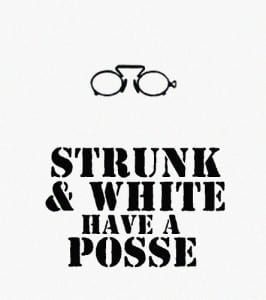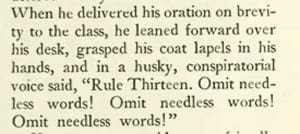WHAT: LECTURE, “The Politics of Style”
WHEN: TOMORROW, Tuesday, December 13, 6 – 8:30 P.M.
WHERE: The School of Visual Arts, 136 West 21 Street, 2nd floor.
Presented by the MFA Design Criticism Department, a.k.a D-CRIT.
COST: Free and open to the public. RSVP at http://dcrit.eventbrite.com
SHORT VERSION:
From Adolf Loos’s 1908 essay “Ornament and Crime,” with its proto-Modernist clarion call that “the evolution of culture marches with the elimination of ornament from useful objects,” through the social-Darwinian rhetoric swirling around the streamlined design of Raymond Loewy, Henry Dreyfuss, and Norman Bel Geddes, the cultural logic of the Twentieth Century informs, even now, our notions of what constitutes good writing. Orwell’s 1946 essay “Why I Write,” with its admonition to write clear, concise “prose like a windowpane,” along with Hemingway’s championing of a manly, muscular style, stripped of epicene frippery, helped popularize received truths about style and syntax. But it was Strunk’s Elements of Style (1918) and White’s 1959 revision of it that chiseled the commandments of less-is-more prose for industrial modernity.
In this provocative lecture, cultural critic Mark Dery excavates the Machine Age biases, not to mention the chest-thumping gender politics (latent misogyny, creeping homophobia) that inflect Anglo-American ideas about “good writing.” Dery directs our attention to the stylistic countercurrent running beneath the surface of Modernist prose style—a polymorphous, perverse tradition of exuberant overwriting and overthinking whose Proustian syntax, hothouse neologisms, polysyllabic exuberance, unapologetic embrace of the much-maligned adjective, and associative, digression-friendly mode of thought rejoice in the criminality of ornament.


